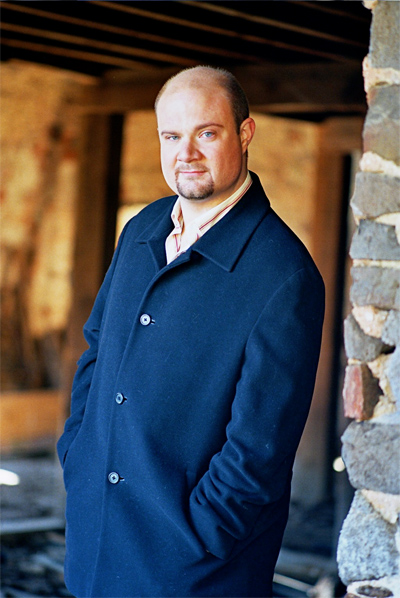Rockport Festival serves up a varied evening of Schubert

Baritone Randall Scarlata performed Schubert lieder Friday night at the Rockport Chamber Music Festival.
Composition was the center of Franz Schubert’s life. And when the composer wasn’t working, he got together with friends in private homes for poetry readings, dancing, games of charades, and more than a little amount of drinking. But above all, these Schubertiades, as these informal gatherings came to be called, featured performances of the composer’s music.
Today, concerts dedicated to Schubert’s works are usually formal affairs, though the intimacy
that the composer sought to express in his chamber music remains ever present, especially when heard in cozy surroundings.
That was the case Friday night in Rockport’s Shalin Liu Performance Center, where Jennifer Koh (violin), Shai Wosner (piano), and Randall Scarlata (baritone) offered a Schubertiade of their own through elegant performances of the composer’s chamber music and songs.
Before the age of twenty, Schubert had completed four symphonies, masses, an opera, and a few hundred songs. Among this prolific output was a set of three violin sonatas, works of such Mozartean grace and intimate, compact lyricism that Anton Diabelli published them with the title “Sonatina” to appeal to amateur musicians.
But such a name is a little misleading as these works display a high level of difficulty and a remarkable balance in texture and form, aspects that define the heftier sonatas of Beethoven.
Koh and Wosner offered the first of the set, the Sonatina in D major, D. 384, Friday evening.
From the opening, which featured the violinist and pianist in soft but stately unison phrases, the two musicians proved equal partners. Koh played with a gleaming tone that brought just the right amount of intensity to the line, and Wosner answered with sensitive touch and passages of bell-toned clarity.
The only problems in this reading came in the third movement. Here, squeaks and moments of pitchy intonation marred Koh’s technical passages, bumps in an otherwise buoyant reading.
The second movement fared best. Wosner and Koh took the time to shape the phrases with care and sensitivity. The highlight of the movement featured Koh floating an amber-rich melody over delicate piano phrases.
Similarly tender is Schubert’s Piano Sonata in A major, D. 664, which opened the concert. Nicknamed the “Little A major” because of its shorter length than the grandiose A major sonata Schubert penned near the end of his life, the piece brims with singing melodic lines and rich harmonies.
Wosner has earned acclaim for his interpretations of Schubert’s solo piano works. He certainly has the tools for such music as he plays with a clear technique and lustrous tone.
His interpretation of the “Little A major” Friday evening was convincing even though he didn’t seem to have the best of nights with the work. The third movement, in particular, suffered from a few clinkers. Some of his runs also felt labored and directionless, rushing off to nowhere. However, he made dexterous work of the trickling lines that open the movement and shaped the dance-like character of the principal theme with a hint of space between figures.
His performance of the first movement was graceful, the silky theme that opens the work unfolding delicately in Wosner’s brisk tempo.
Most affecting was the second movement. Wosner’s phrasing was spacious, his tone pearly and deep as he was able to mine penetrating sonorities from the lightest touch.
No Schubertiade would be complete without Schubert’s songs, and the second half of the
program featured Scarlata and Wosner in some of the composer’s most beloved music.
The first featured the baritone’s smooth, radiant voice in songs that dealt with themes of water.
Scarlata sings with diction of spring-water clarity and with a fine feel to the drama inherent in these works. With deep, dark voice he captured the haunting images of “Auf der Donau,” and for “Fischerweise,” he softened his tone to match the bright and bubbly music.
“Der Schiffer” featured some of his most colorful singing, his full, declamatory voice handily portraying images of a storm-tossed river that mark Johann Baptist Mayrhofer’s poem. Even in a well-performed classic like “Die Forelle” Scarlata moved between warm lyricism and passages of heavy sonority to get to the heart of the song’s text (written by Christian Friedrich Daniel Schubart, not “Schubert” as stated in the program).
Power and drama also marked Scarlata’s performance of selections from Schwanengesang, a collection of songs published together after Schubert’s death. Scarlata brought a light and nimble tone to “Am Meer,” taking care to imbue his phrases with hints of sadness to portray the heartbreak that comes in the song’s conclusion.
The death-haunted trilogy of “Ihr Bild,” “Die Stadt,” and “Der Doppelgänger” was stark, the singer rendering his lines with bitter touch as they hovered over Wosner’s icy accompaniment.
Throughout, Wosner made a fine musical partner, and the songs featured him in some of his most lively and colorful playing of the evening. “Der Atlas” was robust, with the pianist’s passages crashing in great waves. His accompaniment to “Das Fischermädchen” beamed with lyrical warmth.
The next concert of the Rockport Chamber Music Festival will feature the Boston Trio in music by Beamish, Fauré, and Debussy 8 p.m. Saturday at the Shalin Liu Performance Center. rockportmusic.org
Posted in Performances




